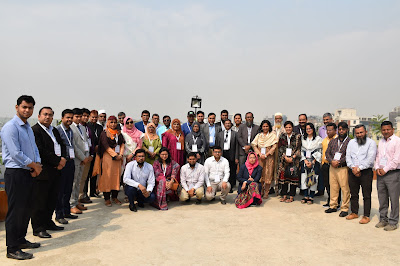The Annual Advancement Meeting of AGGRi Network Trials (ANT) 2023 was held from 11-12 March 2023 in Dhaka, Bangladesh. Since rice is the life of Bangladesh, the International Rice Research Institute (IRRI) has played a significant role for the last six decades to improve rice research in the country. IRRI has been assisting Bangladesh in developing superior and high-yielding rice varieties by identifying novel breeding lines adapted to Bangladesh's diverse environmental conditions. Therefore, assisting farmers in boosting their production and enhancing the food security of the country. Implementing the AGGRi (Accelerated Genetic Gain in Rice) Network project stimulates the existing and new IRRI-NARES breeding networks to jointly develop sustainable breeding strategies based on carefully considered and agreed on product profiles for the replacement of old mega varieties within a target environment or market segment.
The advanced rice breeding materials were tested for early, medium, and late maturity groups. They were tested to select the superior breeding lines under different environments in Bangladesh through on-farm field trials under the supervision of the IRRI-Bangladesh and NARes partners viz., Bangladesh Rice Research Institute (BRRI), Bangladesh Institute of Nuclear Agriculture (BINA), Bangabandhu Sheikh Mujibur Rahman Agricultural University (BSMRAU), Sylhet Agricultural University (SAU) and Khulna University (KU). The results presented in this event were from the various field tests conducted during the T. Aman season in 2022. The experiments were conducted in Gazipur, Rajshahi, Rangpur, Kushtia, Cumilla, Satkhira, Habiganj, Sylhet, Kurigram, Noakhali, Cox’s Bazar, and Barisal. The findings of the trials are valuable for IRRI, NARes partners, and private entities as these could help enrich their rice breeding research and development and inform how they develop new varieties.
Dr. Md. Shahjahan Kabir, Director General of BRRI, was present as a chief guest and Dr. Mirza Mofazzal Islam, Director General of BINA, was present as a special guest at the meeting. Dr. Humnath Bhandari, IRRI Country Representative for Bangladesh, chaired the event. A wide range of participants attended the meeting, including scientists and rice breeders from IRRI HQ, India, and Bangladesh; scientists from BRRI and BINA, and Professors from BSMRAU, KU, and SAU.
Dr. Mohammad Rafiqul Islam, Project Lead, delivered a welcome speech and discussed the agenda, and provided updates on AGGRi Network Trials conducted in Bangladesh.
“Taken together, the improvements in product focus, selection accuracy, selection intensity, and cycle length, driven by the effective application of new genotyping, phenotyping, and decision support technologies, have the potential to raise the current rate of genetic gain in the staple food crops produced by farmers in the developing world from a current rate that is likely well under 1% annually (and in many instances not significantly different than zero) to at least 2%,” shared Dr. Mirza Mofazzal Islam, BINA Director General. “In the process, farmers will be better protected against a rapidly changing climate and better able to adapt to rapidly commercializing production systems.”
“We have lots of challenges in the future for sustaining food security; Bangladesh needs massive reform in human resource development and physical facilities. It is expected that IRRI’s contribution and collaboration will be continued for the upgradation of the research capacity of public and private partners, particularly in the field of cutting-edge technologies like genomics, phenomics, proteomics, bioinformatics, genome editing, speed breeding, automation, digitization, mechanization, and infrastructure development,” said Dr. Humnath Bhandari, IRRI Country Representative for Bangladesh.
At the end of the program, the chief guest and special guest mentioned that this event was important and timely for rice research in Bangladesh, and they hoped that IRRI will continue their research in Bangladesh to improve our rice breeding and play a key role in food security in Bangladesh.
###
Learn more about IRRI (www.irri.org) or follow us on social media and networks (all links down the right column).

.JPG)
.JPG)

No comments:
Post a Comment